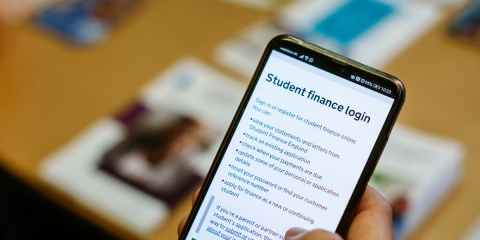
When you start at uni, it's important to understand how to budget your money. You don't have to be rich, you just need to know how to spend your money responsibly.
You've spent years making sure you have the grades to start your studies – but your school or college might not have told you how to budget your money, once you get to university.
On this page, you'll find useful advice on how you can spread out your student loan, help with making and sticking to a budget, guidance on how to calculate your living costs and useful ways you could save money while you study.
Planning your student budget
Planning out your budget isn't as much work as it sounds. All you need to do is work out how much money you'll have coming in and out of your bank account each month.
Once you know the money coming in and out, you'll know how much extra spending money you have each month. Make sure that the amount going out isn't higher than the amount coming in.
If you budget well enough, you might even be able to save some money each month to use on travel and essential living costs, such as a rent deposit for next year.

Start by working out how much money you have to spend.
Step 1: Work out your income
The first step in planning your budget is to work out how much income you'll have each month. It's a simple case of knowing where your money is coming from, and how much you're getting from each source.
Your main source of income is likely to be your maintenance loan or bursary. Make sure you include your government loan in your student budget so you spread it out evenly over the academic year.
Undergraduate maintenance loan
If you're from the UK and planning to start your first degree, you can apply for a maintenance loan from your country's government. This loan is designed to help you cover your living costs.
Unlike your tuition fee loan, which is paid directly to the university, you'll receive your maintenance loan directly into your bank account in 3 instalments during the year. If you're being funded by Student Finance England, how much you get per year depends on where you live when you study and your household income. The maximum you can get is £12,383 a year if you plan to study in London. If you study outside of London the maximum you can get is £9,706 a year.
You won't start paying back your maintenance loan until after you leave uni and if your gross income is more than £27,295. This still applies if you don't complete your course – you'll still need to make repayment contributions towards what you borrowed.
Use the student finance calculator to figure out how much government loan you could get.
See our student loans guide to find out more about maintenance loans for full-time and part-time undergraduate courses.
Postgraduate funding
You can also get financial support from your government if you're from the UK and planning to study a postgraduate master's course. However, each country in the UK has its own funding body with different conditions and requirements. To find out more, please visit your country's government student funding website:
- UK Gov – funding for postgraduate study
- Student Awards Agency Scotland – postgraduate funding information
- Student Finance Wales – postgraduate student funding
- Student Finance Northern Ireland – postgraduate Northern Ireland students
Postgraduate funding covers your tuition fees as well your living costs. Unlike undergraduate funding, you won't receive separate loans for your tuition fees and living costs.
The maximum loan you can get is £11,570. You won't start paying this back until you leave university and your gross income is over £21,000. This still applies if you don't complete your course – you'll still need to make repayment contributions towards what you borrowed.
To find out more about the government's postgraduate maintenance loan for taught master's, see our postgraduate guide to loans, scholarships and bursaries.
If you plan to study a postgraduate research degree, you can apply for a doctoral loan from the UK government if you're from the UK or from Student Finance Wales if you're from Wales. See our guide to funding your research degree.
Scholarships, bursaries or grants
If you're receiving a scholarship, bursary or grant, this should also go into your student budget.
Most universities have scholarships and bursaries you can apply for. These could partly or fully cover your living costs. And the best part about them is that you don't have to pay them back.
When you're choosing where and what to study, make sure to research what scholarships and bursaries might be offered by the university.
You can apply for additional finance if:
Personal allowance
If you've saved money to go towards your living costs, or get an allowance from your parents or guardians, include this in your budget as monthly income. If you've saved up money from working before starting uni, decide how much you want to use on your living costs and work out how you can spread it out into your monthly budget.
Part-time work or salary
If you're going to work while you study, include this income in your budget. If you're working part-time while studying full-time, we recommend you only work 10 hours a week. However, you might be studying part-time or doing a postgraduate master's over a few years, in which case you'll need to manage your time as it works best for you.
See our guides on balancing full-time work and study.

Working part-time can increase your budget and help you be part of the local community.
Step 2: Work out your expenses
The next step in planning your budget is to work out what you're spending. Average student living costs can vary depending on where you'll be living, what course you're doing and how you want to spend your free time. The following are all areas to look at when calculating your expenses.
When looking at these areas, assign each one a budget and try not to overspend each month. Your rent will be fixed, but you can shop around for the best utility deals and plan your meals to avoid overspending on groceries.
Rent
If you're coming to uni after living with parents or guardians, paying rent might be the biggest shock to your finances. In the National Student Money Survey 2025, students reported that they spend more money on rent than anything else. So make sure you include this in your budget.
Of course, if you continue to live at home while studying, your parents or guardians might still charge rent. But it's good to think about this when choosing a university.
Living costs
If you're moving into student halls, you'll find that most universities include living costs such as gas and water bills in the monthly rent. But if you're renting privately, or moving into a shared house, utility bills might not be included.
Your utility bills could include some or all of the following:
- gas
- electricity
- water
- broadband
- TV license
Use comparison sites like Compare The Market and Money Supermarket to find the best deals for utilities.
If you're looking to rent privately, and not live in student halls, make sure you check for a 'fair usage' policy in a contract that includes bills in the rent. Fair usage means your heating and water costs might be capped by the landlord, after which they'll charge you for the extra costs.
Also consider living costs you have outside of your accommodation such as:
- your mobile phone bill
- travel costs – such as a bus pass to and from campus
- TV streaming subscriptions – such as Netflix, Disney+, NOW TV and Amazon Prime
We've put together a guide for estimated student living costs in halls of residence and private accommodation in Portsmouth. See the average student living costs for our students.
Not sure whether to live at home, in student halls or rent private accommodation? See out guide to choosing where to live at uni.
Food costs
The next big item students in the National Student Money Survey 2025 spend their money on is groceries. Living away from home means buying and preparing your breakfast, lunch and dinner every day. And while it can be exciting to experiment with top-shelf ingredients, or treat your housemates to a feast once in a while, you're going to want to shop on a budget.
The best way to make a budget for your food costs is to plan out what you want to eat for the week, make a list of ingredients and then stick to that list when you go shopping. Try not to shop when hungry - you’ll only end up buying a lot more food than you’ll actually need. Plan to eat budget meals some nights, and treat yourself on others to balance out the cost.
You could also look up batch and bulk cooking ideas - you don’t have to eat it all one go, the freezer is your best friend for giving future you healthy ‘ready meals’.
Preparing lunch from leftovers and taking a packed lunch to uni is a great way to keep grocery costs down. Grabbing a sandwich and a packet of crisps from the local shop adds up quickly if you're doing it every day. The same goes for buying coffee and water every day.
Instead, prepare your coffee in a flask and buy a reusable water bottle you can keep topped up during the day. You'll save money and help improve the environment. If you like the idea of that, see our guide on ways to live sustainably at university.
Other ideas to help you save money on food and groceries:
- Look out for ‘reduced’ stickers — head to the reduced section in supermarkets for the best deals, you’ll normally find the biggest selection in the evening.
- Pay attention to the ‘price per kg’ on labels when food shopping to get the best value for money.
- Avoid food wastage - after you’ve spent your cash on food, the last thing you want is for it to go off and have to be thrown away! Don’t forget how to keep different foods fresh.
- Put lids on pans while cooking to keep the heat in, and keep the oven door closed when checking on your food.
- Take and reuse leftovers - if you do eat out, don’t be afraid to ask for a ‘doggy bag’ for your leftovers - after all you’ve paid for them already! Meat and veg from other meals can be repurposed into dishes like bubble and squeak or soups.
- When in campus cafes, don’t forget to show your ID card to benefit from the loyalty scheme and bring a reusable cup with you to save even more money.
- Go meat-free — meat is often the most expensive part of a meal. Replace it with cheaper alternatives like tinned beans and lentils.
- Delete the food delivery apps - they can be a lifesaver at times, but having them on your phone means it’s often too easy to be tempted into spending money with them. Removing them from your phone can be a quick win.
- Cook meals together - even if it’s one meal a week together as a flat or house, you’ll save energy (not to mention money on your food bills and time and energy) by sharing.
- Buy larger quantities of food, if you have the room to store them, and share ingredients like cooking oil, spices, pasta and rice with your housemates.
Additional course costs
Depending on your course, you'll also need to factor the following course costs into your expenses budget:
- Books for recommended reading
- Specialist equipment or clothing
- Optional field trips
- Optional modules
When studying with us, we recommend you budget £75 a year for photocopying, memory sticks, DVDs and CDs, printing charges, binding and specialist printing.
You can work to reduce your additional course costs by seeing what's on offer at your uni. They might have some of the books you need in the library so you don't have to buy them. At Portsmouth, our Library also gives you a £10 printing credit at the start of the academic year, which you can top up as and when necessary.
You'll find additional course cost recommendations listed on all our course pages. Use our course search to find out more.
Non-essential costs
Rent, living costs, food costs and additional course costs are all essential areas of your budget. This means that if you can't afford them each month you may get into trouble with your landlord or miss out on field trips with your classmates.
Non-essential costs are everything else including nights out with friends, takeaway dinners, trips to the cinema, holidays and clothes. But just because they're non-essential, that doesn't mean you shouldn't budget for them.
In your budget plan, work out how much money you'll have left after paying for rent, utilities, food and additional course costs each month. Then use that to set yourself a budget for non-essential items each month and stick to that budget.
By sticking to your budget for non-essential items, you'll prevent yourself using money you could save for a holiday to buy clothes you might not need. Or getting too many takeaways and not being able to afford a trip to visit friends at other universities.
Reduce expenses with student discounts
When calculating your expenses, make as much use of student discounts as possible.
You can find student discounts for almost everything you need for your studies including utility bills, equipment, clothing, books and stationery, groceries and entertainment. They're a great way to reduce the cost of essential and non-essential items. Treating yourself with a discount code is just as indulgent as paying full price.
As soon as you get your student ID and email address from your university, apply for discounts that could help you reduce your expenses. These could include:
- TOTUM – this is the UK's #1 student card and the official card of the National Union of Students (NUS) offering discounts on clothing, homeware, fitness products and mobile phones
- UNiDAYS – just enter your uni email address for free membership and discounts on clothing, food and drink, tech, beauty and lifestyle
- 16 – 25 Railcard – 1/3 off rail travel for anyone aged 16 – 25 and mature students studying full-time – perfect for those of you planning to travel by train to visit friends and family often

Creating a budget will help you treat yourself guilt-free with out overspending.
Step 3: Work out your budget
Once you've noted all your income and expenses, use our budget calculator to work out how much money you'll have each month once your expenses are accounted for.
Once you've planned your budget, you'll want to keep all your income and expenses somewhere you can easily refer to. This could be in a student budget spreadsheet or a budgeting app.
Save The Student has a student budgeting spreadsheet you can download to track all your income and expenses. It will tell you how much money you have left each month and help you see where you can make savings.
Budget planning apps
There are many budgeting apps out there if you prefer to keep track of your spending on your smartphone than on a spreadsheet.
When using any app, always remember to research and read the reviews to make sure it's trustworthy. You'll be inputting your financial data into these apps, so it's best to be cautious.
The following are some of the most popular apps for budgeting:
Bank accounts
Your maintenance loan will be paid into your personal or student bank account each term. Follow our tips for making the most of your account:
- Some student bank accounts come with an interest-free overdraft – be careful not to treat this as free money and only use it in an emergency
- Set up a separate bank account for your monthly direct debit expenses like bills and insurance – pay the exact amount you'll need into it each month to separate your spare money from your essential costs
- Set up a savings account and put any extra money in at the end of the month – or commit to putting a percentage of your monthly income in at the start of the month
Further resources
The following sites can offer advice on all areas of budgeting and saving money while at uni:
Enable University alerts
Turn on notifications for critical updates like closures, safety alerts, and urgent service disruptions.






